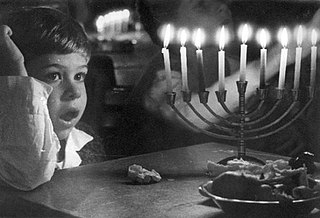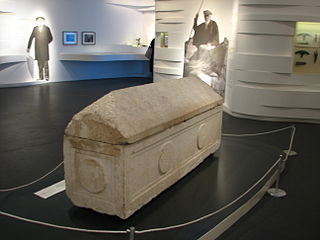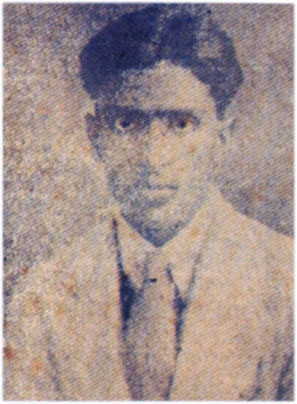Nashim is the third order of the Mishnah containing family law. Of the six orders of the Mishnah, it is the shortest.
In the Hebrew Bible, a nazirite or a nazarite is a man or woman who voluntarily took a vow which is described in Numbers 6:1–21. This vow required the nazirite to:
In biblical studies, inclusio is a literary device similar to a refrain. It is also known as bracketing or an envelope structure, and consists of the repetition of material at the beginning and end of a section of text.
Nasir is a masculine given name, commonly found in Arabic which can mean "helper" or "one who gives victory". The female form of the name is Nasira. Alternative spellings of this name, possibly due to transliteration, include Naser, Nasser, Naseer, and Nacer. People with this name include:
Nazir Ahmed may refer to:

Nazeer Akbarabadi was an 18th-century Indian poet known as "Father of Nazm", who wrote Urdu ghazals and nazms under the pen name (takhallus) "Nazeer", most remembered for his poems like Banjaranama, a satire.

Simeon the Righteous or Simeon the Just was a Jewish High Priest during the Second Temple period. He is also referred to in the Mishnah, where he is described as one of the last members of the Great Assembly.

Naso or Nasso is the 35th weekly Torah portion in the annual Jewish cycle of Torah reading and the second in the Book of Numbers. It constitutes Numbers 4:21–7:89. The parashah addresses priestly duties, camp purification, restitution for wrongs committed, the wife accused of unfaithfulness, the nazirite, the Priestly Blessing, and consecration of the Tabernacle. Naso has the largest number of letters, words, and verses of any of the 54 weekly Torah portions. The parashah is made up of 8,632 Hebrew letters, 2,264 Hebrew words, 176 verses, and 311 lines in a Torah Scroll.

David Cohen was a rabbi, talmudist, philosopher, kabbalist, and a disciple of Rabbi Abraham Isaac Kook. A noted Jewish ascetic, he took a Nazirite vow at the outbreak of World War I.
Nazir is a treatise of the Mishnah and the Tosefta and in both Talmuds, devoted chiefly to a discussion of the laws of the Nazirite laid down in Numbers 6:1-21. In the Tosefta its title is Nezirut ("Nazariteness"). In most of the editions of the Mishnah, this treatise is the fourth in the order Nashim, and it is divided into 9 chapters, containing 48 paragraphs in all.

Helena of Adiabene was a queen mother of the Parthian vassal state of Adiabene. With her husband and brother Monobaz I, she was the mother of Izates II and Monobaz II. Helena became a convert to Judaism about the year 30 CE. According to Josephus, Helena was the daughter of King Izates. Moses of Chorene makes her the chief wife of Abgar V, king of Edessa.

Asceticism is a lifestyle characterized by abstinence from sensual pleasures, often for the purpose of pursuing spiritual goals. Asceticism has not been a dominant theme within Judaism, but minor-to-significant ascetic traditions have been a part of Jewish spirituality.

Syed Nazeer Niazi was an eminent Muslim scholar, professor and journalist. He was one of the leading activists of the Pakistan movement. He was James Boswell of Allama Iqbal. His biography of Iqbal, Iqbal kay Hazoor, and Maktoobat-e-Iqbal Banaam Nazir Niazi are basic sources for the study of Iqbal. During the last two years of Iqbal's life, he regularly visited him and recorded his conversation in his book "Iqbal Kai Hazoor". He completed this conversation in three volumes, but unfortunately the last two volumes were destroyed. Only first volume was published.
Impurity of the land of the nations is a rabbinic edict stipulating a specified degree of tumah (impurity) on all lands outside the Land of Israel. The demarcation lines of foreign lands effectually included all those lands not settled by the people of Israel during their return from the Babylonian exile during the Second Temple period, and was meant to dissuade the priests of Aaron's lineage from venturing beyond the Land of Israel where graves were unmarked, and who may inadvertently contract corpse uncleanness and thereby eat their bread-offering (Terumah), unawares, in a state of ritual impurity and becoming liable thereby to kareth. The declaration with respect to foreign lands includes also the "virgin soil" of those lands, and was, therefore, a safeguard meant to prevent the priests from inadvertently transgressing the Law of Moses.
Nazir or Nazeer is both a given name and a surname. Occurrences of the name include:
Zevachim is the first tractate of Seder Kodashim of the Mishnah, the Talmud and the Tosefta. This tractate discusses the topics related to the sacrificial system of the Temple in Jerusalem, namely the laws for animal and bird offerings, and the conditions which make them acceptable or not, as specified in the Torah, primarily in the book of Leviticus. The tractate has fourteen chapters divided into 101 mishnayot, or paragraphs. There is a Gemara – rabbinical commentary and analysis – for this tractate in the Babylonian Talmud, and no Gemara in the Jerusalem Talmud.
Nazeer Sankranthi is an Indian actor of Malayalam Cinema as well as Malayalam television shows. He rose to prominence with his humorous act of Thatteem Mutteem, a popular soap opera on Mazhavil Manorama. Naseer is also a two time winner of Kerala State Television award for the best comedian and has played notable roles in several films like The Priest, Swarna Kaduva and Kappela.






